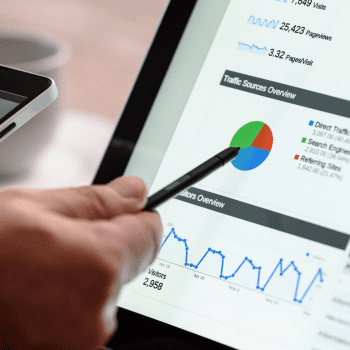Introduction to Google Ads
In today’s digital world, online advertising has become an essential tool for businesses of all sizes. Among the various online advertising platforms available, Google Ads is one of the most popular and effective. It is a pay-per-click (PPC) advertising platform that allows businesses to create ads that appear on Google’s search engine results pages (SERPs) and other websites that are part of the Google Display Network. In this article, we will explore what Google Ads is, how it works, and how it can benefit your business.
What is Google Ads and how does it work?
Google Ads, formerly known as Google AdWords, is an online advertising platform created by Google in 2000. It allows businesses to create text, display, and video ads that appear on Google’s search engine results pages, as well as on other websites that are part of the Google Display Network. The platform operates on a pay-per-click (PPC) model, which means that advertisers only pay when someone clicks on their ad.
Google Ads works by allowing businesses to bid on keywords that are relevant to their products or services. When someone searches for a keyword that an advertiser has bid on, Google’s algorithm determines which ads to display based on the bid amount, ad relevance, and other factors. The higher an advertiser bids for a keyword, the more likely their ad will appear at the top of the search results.
The benefits of using Google Ads for your business
Google Ads offers several benefits that make it an attractive advertising platform for businesses. Firstly, it allows businesses to reach a large and diverse audience. Google is the world’s most popular search engine, with over 90% of the search engine market share. This means that businesses can potentially reach millions of people who are actively searching for their products or services.
Secondly, Google Ads is a highly targeted advertising platform. Advertisers can choose which keywords their ads will appear for, which geographic locations they want to target, and even which time of day their ads will appear. This level of targeting ensures that businesses are reaching the right audience at the right time.
Lastly, Google Ads is a cost-effective advertising platform. Advertisers only pay when someone clicks on their ad, which means that they are only paying for actual clicks and not just for ad impressions. Additionally, businesses can set a daily budget and bid amount, which allows them to control their advertising costs.
Understanding the Google Keyword Planner
The Google Keyword Planner is a free tool provided by Google Ads that helps businesses find keywords for their ad campaigns. It provides information on keyword search volume, competition, and suggested bid amounts. By using the Keyword Planner, businesses can identify high-volume, low-competition keywords that they can bid on to maximize their ad exposure.
To use the Keyword Planner, businesses need to create a Google Ads account and set up a campaign. Once they have done that, they can access the Keyword Planner from the Tools menu. From there, they can enter a keyword or a list of keywords and get data on search volume, competition, and suggested bid amount.
Keyword research for Google Ads
Keyword research is a critical component of any successful Google Ads campaign. It involves identifying the keywords that potential customers are using to search for products or services that are relevant to your business. By targeting the right keywords, businesses can ensure that their ads are being shown to the right audience.
To conduct keyword research for Google Ads, businesses can use a variety of tools, including the Google Keyword Planner, Google Trends, and third-party keyword research tools. The goal is to identify high-volume, low-competition keywords that are relevant to your business and that your target audience is using to search for products or services.
Once businesses have identified their target keywords, they can create ad groups that are focused on those keywords. Ad groups allow businesses to create ads that are highly relevant to the keywords being targeted, which can improve the ad’s relevance score and ultimately lead to better ad performance.
Creating effective ad campaigns on Google Ads
Creating effective ad campaigns on Google Ads requires a combination of keyword research, ad copywriting, and ad targeting. Ad copywriting involves creating compelling and relevant ad copy that will encourage potential customers to click on the ad. Ad targeting involves choosing the right keywords, geographic locations, and ad formats to ensure that the ad is being shown to the right audience.
To create effective ad campaigns on Google Ads, businesses should follow these steps:
1. Conduct keyword research to identify relevant keywords for your business.
2. Create ad groups that are focused on those keywords.
3. Write compelling ad copy that is relevant to the keywords being targeted.
4. Choose the right targeting options, including geographic locations and ad formats.
Ad targeting options on Google Ads
Google Ads offers a variety of ad targeting options that businesses can use to ensure that their ads are being shown to the right audience. These targeting options include:
- Not conducting proper keyword research: Without proper keyword research, businesses risk bidding on keywords that are too broad or too competitive, which can result in poor ad performance.
- Not targeting the right audience: Without proper targeting, businesses risk showing their ads to people who are not interested in their products or services.
- Not using compelling ad copy: Without compelling ad copy, businesses risk not capturing the attention of potential customers and missing out on clicks and conversions.
- Not monitoring campaign performance: Without monitoring campaign performance, businesses risk not identifying issues or opportunities for improvement.
Conclusion: Is Google Ads right for your business?
In conclusion, Google Ads can be an effective advertising platform for businesses of all sizes. It offers a large and diverse audience, highly targeted advertising options, and cost-effective advertising costs. However, to succeed on Google Ads, businesses need to conduct proper keyword research, create effective ad campaigns, and monitor their campaign performance regularly. By doing so, businesses can unlock the secrets of Google Ads and reap the benefits of a successful online advertising campaign.
- Click-through rate (CTR): This measures the number of clicks on an ad compared to the number of impressions it receives.
- Conversion rate: This measures the number of conversions (such as sales, leads, or sign-ups) compared to the number of clicks on an ad.
- Cost per click (CPC): This measures the average cost of each click on an ad.
- Return on investment (ROI): This measures the amount of revenue generated compared to the amount spent onadvertising.
By tracking these metrics, businesses can identify which ad campaigns are performing well and which ones need improvement. They can also make adjustments to their campaigns based on the data to improve their overall performance.
Common mistakes to avoid when using Google Ads
While Google Ads can be an effective advertising platform, there are several common mistakes that businesses should avoid to ensure the success of their campaigns. These mistakes include:
- Not conducting proper keyword research: Without proper keyword research, businesses risk bidding on keywords that are too broad or too competitive, which can result in poor ad performance.
- Not targeting the right audience: Without proper targeting, businesses risk showing their ads to people who are not interested in their products or services.
- Not using compelling ad copy: Without compelling ad copy, businesses risk not capturing the attention of potential customers and missing out on clicks and conversions.
- Not monitoring campaign performance: Without monitoring campaign performance, businesses risk not identifying issues or opportunities for improvement.
Conclusion: Is Google Ads right for your business?
In conclusion, Google Ads can be an effective advertising platform for businesses of all sizes. It offers a large and diverse audience, highly targeted advertising options, and cost-effective advertising costs. However, to succeed on Google Ads, businesses need to conduct proper keyword research, create effective ad campaigns, and monitor their campaign performance regularly. By doing so, businesses can unlock the secrets of Google Ads and reap the benefits of a successful online advertising campaign.



